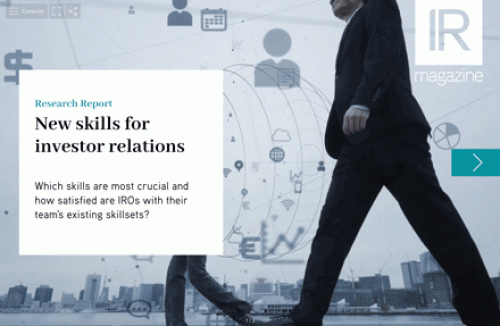Jason Scott has been head of IR at JPMorgan Chase since 2016 but in January he’ll be moving into a new position as global head of technology finance, with internal hire Reggie Chambers set to take the IR reins.
Here, Scott talks to IR Magazine about how IR teaches you to tell a complicated story and the lessons he’s learned from 2020 – and shares a few tips he’s picked up along the way.
You can hear more from Scott in a video interview he recorded after JPMorgan Chase picked up two awards – for best IR by a senior management team in the large-cap category and best in sector for financials – at the IR Magazine Awards – US 2020.
You’re moving to a new position: global head of technology finance. How has your time in investor relations prepared you for this new position?
Investor relations is about telling an inherently complex story in a simple way. That requires collaboration across the firm, digging into challenging material to truly understand the business, the function [and any] new regulation in significant detail in order to explain it externally and internally.
[With that you can] hopefully challenge conventions, drive change and add value – which is exactly what I’m being asked to do in global technology. IR has given me great insight into how we operate the entire firm and invest in businesses and products, and I plan to bring that knowledge and approach to an entirely new function.
What do you think will be the lasting impact of this year – and everything the pandemic has affected – on the role of investor relations?
Operating during the pandemic has reinforced the importance of being proactive and flexible. While there was no shortage of inbounds in March and April, we needed to be more proactive to make sure our investors and analysts understood the impact of the environment on the firm, whether they had reached out or not.
We became more programmatic about setting up conversations with IR and with senior management and it has served us well. But of course we couldn’t do it in the way we always had, so we adapted – using videoconferencing technology and conducting meetings remotely, which we had never done, particularly due to control issues.
We had to completely change the way we interacted without introducing new risks, which took planning and adaptability. But it has also allowed us to reach a broader set of investors bcause we haven’t been constrained by physical proximity. While I don’t think the pandemic will eliminate the importance of sitting across the table from analysts and investors, it has expanded the art of the possible.
What advice can you offer others as you prepare to move out of IR?
Investor relations is a great job: it’s simultaneously high-level strategic and down in the weeds.
You have the opportunity to directly impact management and investor decisions and you always get to learn. So if you decide to move on to something else, make sure you’re running toward something, not away from it. Understand how the next potential role fits in your career path and can accelerate it: leverage your network at your company, seek advice and wait for the right thing – not just the first thing.
Always try to deliver value in every interaction (and you’ll have a lot in IR!) because you never know what that good impression can do to open the next door.










